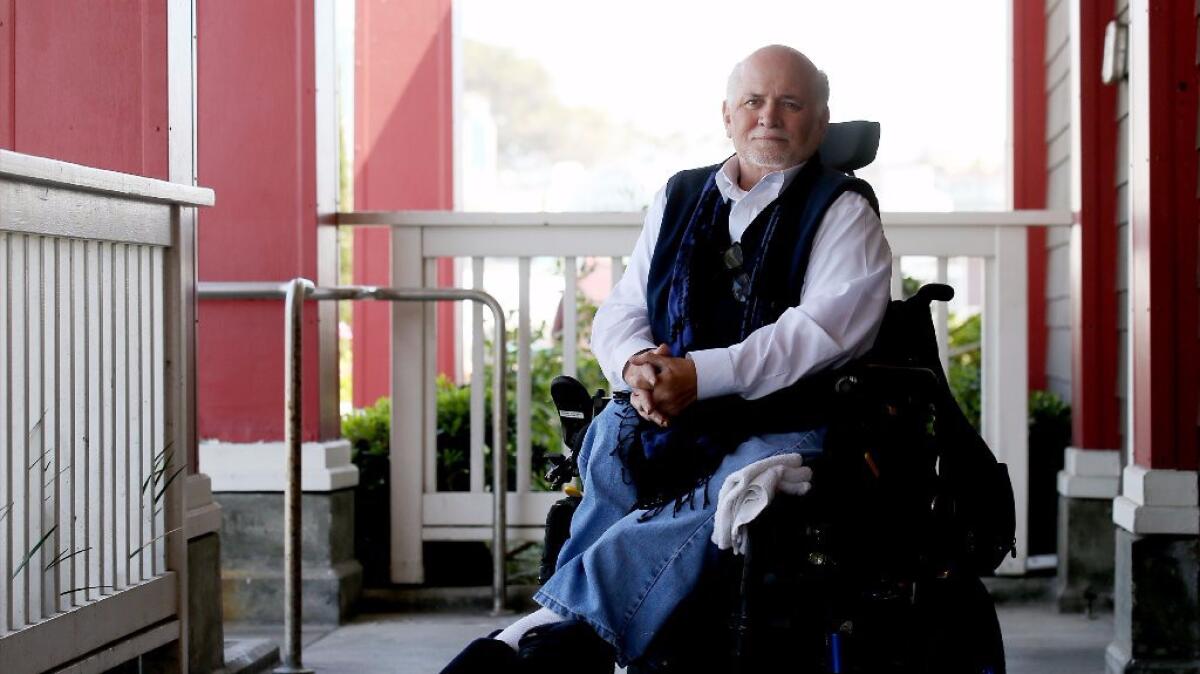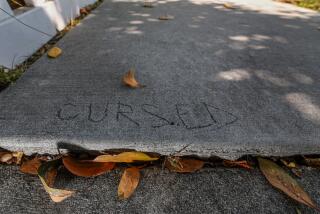Capitol Journal: Activist Ron Kovic says disabled parking cheats ‘just aren’t thinking.’ Or do they just not care?

Reporting from Sacramento — Anyone who saw the movie “Born on the Fourth of July” knows about Ron Kovic, played by Tom Cruise. Marine Sgt. Kovic was shot in Vietnam and paralyzed from the chest down.
The gung-ho warrior-turned-war protester, who co-wrote the screenplay based on his memoir, has used a wheelchair for 49 years. He drives a specially equipped van with hand controls and a ramp that’s needed to roll his chair in and out of the vehicle.
And, like countless California motorists with severe disabilities, particularly in congested Los Angeles, Kovic often has trouble finding a handicapped parking space. After he does, some thoughtless driver just might park illegally in the adjacent restricted space, despite the painted crosshatched lines, and block his reentry.
“I cannot tell you how many times we have seen people illegally parking in the ‘Van Handicapped’ space,” Kovic’s girlfriend, TerriAnn Ferren, emailed me. She wrote after reading my May 1 column reporting on State Auditor Elaine Howle’s investigation into disabled parking placard abuse.
“On more occasions than I care to mention, we have come out of a restaurant, a movie, even church and found someone parked illegally over the diagonal lines,” Ferren continued.
“What happens next is this: I round up at least two or three men who are willing to help me. Then I get into the van — remember there is no driver’s seat as my boyfriend’s wheelchair locks behind the wheel for him to drive — and I put the car in neutral. Then the strong men push the van back far enough for the ramp to clear the car parked illegally so my boyfriend can get in and we can drive away.
“I know that sounds ridiculous, but it is absolutely true.”
Ferren then revealed that her boyfriend is Kovic and he lives in Redondo Beach. So I called him.
“I know people are in a rush,” he said of the cheaters. “But if they block someone from getting back in their van, he may not be able to get in. He may need to go home or may have a medical issue. I don’t think people realize. They just aren’t thinking.”
He gives them more credit than I do. I think they just don’t care. If they were to look Kovic in the eye, they’d never park there. Absent that, they pretend he doesn’t exist.
Jaime Garza, spokesman for the Department of Motor Vehicles, which the auditor accused of poorly managing the placard program, said many scofflaws know exactly what they’re doing but play dumb.
“We find a lot of people using their mothers’, their grandmothers’ placards,” Garza told me. “Then they say, ‘Well, I didn’t know.’ The ignorance bull doesn’t fly. When I was 12, I knew what disabled placards were all about.”
Garza said the DMV is stepping up its sting operations and confiscating the placards of cheaters. So, Grandma, beware.
Ferren, who works for the Torrance Cultural Arts Center, recalled one time when she and Kovic found a motorist parking in a crosshatched space: “I went up and said sweetly, ‘Excuse me, could you back up so we can get the ramp down?’ She said OK. But she was waving her handicap placard at me angrily. She thought just because she had a handicap placard it was her right to do that.”
Maybe it wasn’t even her placard. Anyone who legitimately has one should know it’s illegal to park over diagonal lines.
Not all emailers were as understanding about the disabled as Ferren was.
This was from Louis: “The whole notion of preferential parking for handicapped people is wrong at the very outset…. It is tyranny for the state to force some people to alleviate hardships suffered by others.”
He called it the product of “left-wing do-gooders.”
Chalk that up to today’s political and cultural divisiveness.
Anyway, it’s hard to imagine anyone calling former Republican President George H.W. Bush a “left-wing do-gooder.” He signed the 1990 Americans with Disabilities Act.
Other emailers objected to my characterizing as “jerks” the guys we’ve all seen who slap a placard on the rearview mirror, leap out and walk briskly to the store. Readers correctly pointed out that some disabilities aren’t readily seen — maybe they’re pulmonary or vascular — and people may walk normally.
But that doesn’t mean they should be entitled to van parking spots adjacent to crosshatched spaces.
There are 2.9 million Californians with disability placards or plates. There’s no fee for permanent placards, and they’re automatically renewed every two years. Holders are entitled to free parking at meters, and time limits are waived.
Two UCLA professors have drafted a proposal designed to reduce abuse. Social welfare professor Fernando Torres-Gil, who uses crutches and a scooter, and urban planning professor Donald Shoup, who has no disability, want to take the financial incentive out of cheating.
They would adopt a two-tier placard system that has been successful in Michigan and Illinois. Motorists with significantly limited mobility continue to get free parking. They often can’t access the meters. But more mobile drivers must pay.
“We think there’s never going to be enough enforcement,” Torres-Gil said. “We want to make a placard less lucrative.”
State Sen. Ben Allen (D-Santa Monica) said he intends to introduce legislation. But he’s not sure what.
“It has become such a problem in Santa Monica and the whole Westside,” he said.
Kovic is one of Allen’s constituents. The paraplegic vet deserves a safe place to park and not to be hassled in his wheelchair.
Follow @LATimesSkelton on Twitter
ALSO
California is right to close its door to offshore drilling — Trump can’t be trusted with our beaches
Big changes are needed at UC — starting with the Kool-Aid-drinking Board of Regents
Was Gov. Brown wrong to make side deals to push through the gas tax hike? No, that’s democracy
More to Read
Get the L.A. Times Politics newsletter
Deeply reported insights into legislation, politics and policy from Sacramento, Washington and beyond. In your inbox three times per week.
You may occasionally receive promotional content from the Los Angeles Times.











